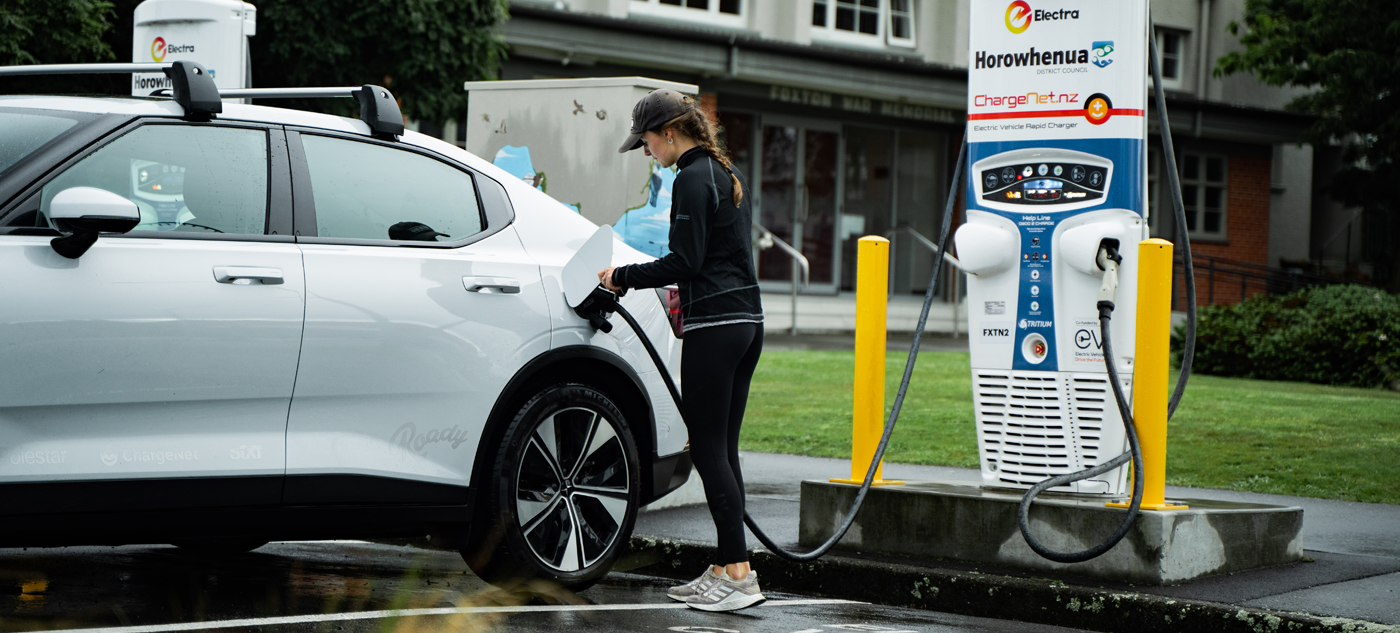
We’ve created a comprehensive guide to support businesses as they switch their fleet to electric vehicles.
In this guide, we’ll walk you through everything you need to familiarise yourself with public EV charging so you can hit the road running.

Every decision made by Kiwi businesses today has an impact on the New Zealand we’ll be living in tomorrow. When implementing sustainability initiatives, it can be difficult to identify which changes will have a positive impact on both the environment and your bottom line – but with transport emissions being the fastest-growing contributor to New Zealand’s total emissions, businesses that switch their fleet to electric vehicles (EVs) can have an instant impact on the environment while also cutting running costs and improving their brand’s reputation. In this article, we’ve rounded up some of the key positive impacts you can expect when you decide to make the switch.
Better for the environment.
While there are many EV benefits, it goes without saying one of the main positives of electric vehicles is that they’re better for the environment than traditional petrol or diesel cars. EVs don’t send any harmful toxins into the atmosphere because they don’t produce any tailpipe emissions, and they also improve overall efficiency by using regenerative braking systems that recover and reuse energy typically wasted in traditional vehicles.
In addition, because more than 80% of New Zealand’s energy is derived from renewable sources such as wind, solar, water and geothermal activity, driving and charging an EV in New Zealand truly has an impact on the sustainability of our local communities as well as the global ecosystem. Humble brag… Many ChargeNet charging points are powered by Ecotricity’s 100% renewable, Toitū climate-positive certified electricity, generated from wind, hydro, and solar.
Lower operating costs.
While environmental considerations are undoubtedly important in business decisions, it’s an added bonus when they make financial sense too. You might be surprised to learn the cost of running a fleet of EVs is equivalent to paying 40 cents per litre for petrol – a price we could only dream of! EVs require fewer oil changes, have fewer mechanical components to replace, and often come with longer warranties than petrol or diesel cars.
Gen Less compared four commonly available EVs to similar petrol cars and found that the average total cost of ownership was lower for electric vehicles. The total cost of ownership came to $36,772 compared to $54,473 for the petrol cars,67.5% of the total cost of owning the petrol alternatives.
There’s also government support up for grabs in the form of the Clean Car Discount Scheme, which was designed to incentivise Kiwis to purchase EVs with a rebate for vehicles being registered in New Zealand for the first time. The Clean Car Discount means zero-emission or low-emission vehicles are eligible for a rebate. If you’re looking to buy a new car anytime soon, it pays to buy electric. The maximum rebate is $7,015 for new vehicles and $3,507 for used imports. Vehicles must be under $80,000 and meet safety requirements to be eligible.
A great public charging network.
Ease and reliability are two of the most important things when looking to implement a major change in your company. While most EV charging is carried out at home or work, public chargers are inevitably needed for top-ups and longer trips. That’s why you’ll be pleased to know there’s already a comprehensive electric vehicle infrastructure in New Zealand, and it’s rapidly expanding. ChargeNet, New Zealand’s nationwide EV charging network, operates more than 300 rapid and hyper-rapid charging points from Cape Reinga to Bluff that can boost an EVs range by 400km in as little as 15 minutes. Our electric vehicle charging stations are easy to access and located in strategic positions throughout the country, making range anxiety a thing of the past.
Fleet visibility.
By nature, EVs are equipped with more advanced technology than traditional vehicles, giving fleet managers and business owners a comprehensive overview of all company vehicles. EVs provide real-time, detailed information about energy consumption, which can be analysed to identify patterns, compare driver efficiency and make informed decisions to optimise energy usage. EVs also produce data about driver behaviour, charging and battery management, maintenance issues and diagnostics as well as GPS tracking. These valuable insights allow businesses to optimise vehicle usage, reduce operational costs and enhance the overall efficiency of their fleets.
Endless options and flexibility.
Not long ago the options for EVs were limited and quite frankly not very attractive. Today, the range of EVs available extends from small city commuters and sleek sedans to 4WDs from brands like Lexus, Mini, Tesla, Peugeot and Porsche – there’s even electric vans and utes on the horizon. The initial outlay for building an electric fleet can be higher than a petrol one, which makes leasing a fantastic option, and many leasing companies, such as our friends at FleetPartners, LeasePlan and Custom Fleet offer a comprehensive range of EVs and support. You can also compare the range of EVs available in New Zealand using Ecotricity’s handy Electric Vehicle Buyers Guide.
At ChargeNet, one of our missions is to build and contribute to a future where EVs are the norm. Since installing our first charger in 2015, we’ve witnessed the rapid uptake of electric vehicles by Kiwi consumers and we’re passionate about businesses playing an integral role in the next stage of EV uptake by electrifying some or all of their fleet. There’s no better time than now to get ahead of the curve and future-proof your business – so what are you waiting for?
If you want to hear more about new charger locations, sign up for our monthly newsletter and get the latest EV news, updates, and special offers delivered to your inbox.